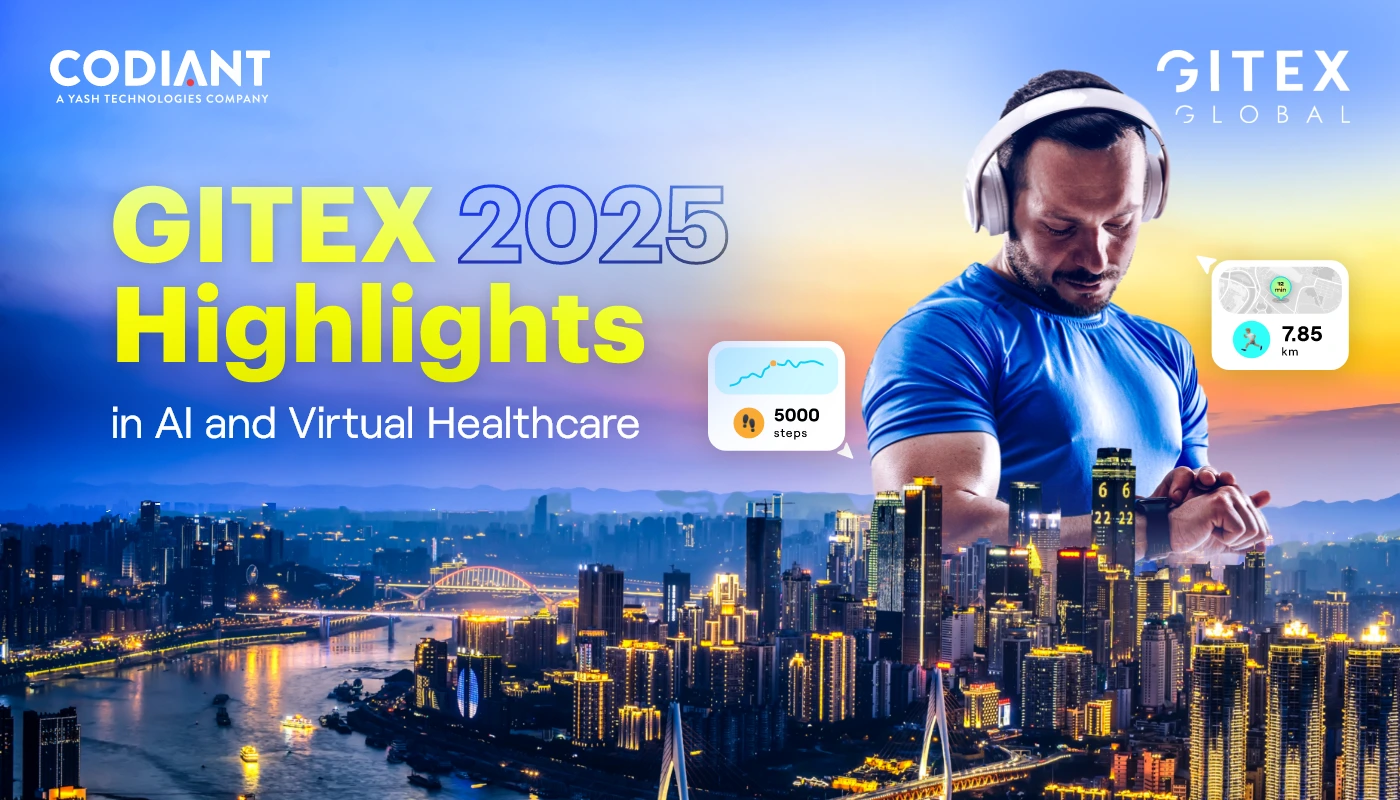GITEX 2025 Spotlights Digital Health 5.0: AI, Wearables, and the Rise of Virtual Twins
Table of Contents
Subscribe To Our Newsletter

A few years ago, a patient’s journey began in a waiting room – stacks of forms, weeks of tests & an anxious hope for answers. Today, that journey can start on a wrist. A wearable device quietly tracks vital signs, an AI system flags irregularity & a doctor thousands of miles away reviews a virtual replica of the patient’s heart before deciding on the next step.
This is not a future vision it is a reality that will be spotlighted at GITEX 2025. The event known for presentation global technology innovations has turned its gaze toward healthcare, framing it as the next frontier for transformative innovation.
Here, Digital Health 5.0 isn’t just a theme – it’s a blueprint for care that is preventive, personalized & deeply connected. Visitors will witness AI diagnosing conditions before symptoms emerge, wearables delivering continuous insights & virtual twins helping clinicians simulate treatments with remarkable precision.
In the halls of GITEX, the conversation isn’t about if healthcare will change, but how soon every patient, doctor & hospital will feel the difference.
Understanding Digital Health 5.0
Healthcare has gone through several upgrades over the years. First, patient records moved from paper to digital systems. Then came online consultations, connected medical devices & basic automation in hospitals. These steps helped improve efficiency, but they didn’t completely change how care is delivered.
Digital Health 5.0 is different. It represents a full digital transformation in healthcare, where technology works continuously in the background to keep people healthier, not just treat them when they’re sick. The driving force behind this shift is artificial intelligence in healthcare, supported by connected devices real-time data & secure digital platforms.
Here’s what it means in practice:
- Personalized care: – AI in medicine and healthcare can study a person’s medical history, lifestyle habits & wearable device data to recommend the right treatment or prevention plan.
- Round-the-clock monitoring: – With machine learning in healthcare and IoT devices, vital signs can be tracked 24/7, helping detect problems early.
- Connected systems: – Hospitals, clinics & even home devices can share data instantly. AI in telemedicine makes remote consultations faster and more accurate.
- Privacy and trust: – Security and transparency are built into every system so patients can trust how their data is used.
At GITEX 2025, this vision will be on display. Visitors will see real examples of AI in Healthcare 2025 – from wearable devices that predict health risks to virtual care platforms that connect doctors and patients anywhere in the world. It’s not a concept for the future; it’s happening now & it’s changing how healthcare works for everyone.
At GITEX 2025, Digital Health 5.0 isn’t a concept on a slide. It’s being demonstrated through live deployments, pilot programs & AI-powered solutions that show exactly how this model can transform care today.
AI’s Expanding Role in Healthcare
When we talk about AI in Healthcare 2025 we are not referring to experimental projects. The technology is already working in hospitals, clinics & even homes – solving real problems that once took hours days or weeks to address.
The strength of artificial intelligence in healthcare lies in its ability to process massive amounts of medical data and make sense of it instantly. This is changing how care is delivered across the board:
Faster, More Accurate Diagnosis
By spotting patterns in scans, lab results & patient histories machine learning in healthcare helps to detect diseases earlier that may be invisible to the human eye. This means doctors can start treatment sooner and with greater precision.
Smarter Remote Consultations
With AI in telemedicine, doctors can assess patient data before a video call begins, recommend the next steps instantly & even use AI-assisted translation for multilingual care.
Predictive Care and Prevention
AI models analyze data from wearables, home monitoring devices & medical records to predict potential health issues before they escalate. This supports a more preventive approach instead of reactive care.
Workflow Automation
From scheduling appointments to summarizing patient visits AI in medicine and healthcare takes over time-consuming administrative work freeing up medical staff to focus on patient interaction.
The result? Healthcare that’s faster, more personalized & more accessible — not just in advanced hospitals but also in remote clinics and home settings.
At GITEX 2025, you’ll see AI powering everything from real-time diagnostic platforms to connected care ecosystems. These are not just technology demos they are proof that the future of healthcare is already here.
Wearables – From Fitness Tracking to Continuous Health Monitoring
A few years back, wearables were all about counting steps or timing your morning run. Now, they’ve moved into something far more important – becoming a key part of the digital transformation in healthcare.
These devices can check your heart rate, monitor oxygen levels, track your sleep & even measure blood sugar. The best part? The information doesn’t just sit in an app. It can be shared with your doctor so they can see what’s happening with your health in real time.
Artificial intelligence in healthcare makes wearables even more useful. By studying your data, AI can notice small changes you might miss – like an irregular heartbeat or unusual activity – and send a warning before things get serious.
For someone managing diabetes or heart disease, this can be life-changing. You don’t need to wait for a clinic visit to know something’s wrong. And for doctors it means better decisions because they’re working with fresh accurate information.
At GITEX 2025, expect to see wearables that feel less like gadgets and more like a personal health partner – helping people stay healthier, catch problems sooner & avoid unnecessary hospital visits.
Virtual Twins: The Next Frontier in Personalized Medicine
Imagine if a doctor could test different treatments on you – without ever touching you. That’s what virtual twins make possible.
A virtual twin is a digital copy of a patient’s body, organ, or system. It’s built using medical scans, test results, and health data. Once created, it can be used to simulate how your body might react to surgery, medication or lifestyle changes.
In the bigger picture of the digital transformation in healthcare, virtual twins are a huge leap forward. Instead of guessing, doctors can “try before they apply” – testing options in a risk-free digital model before making a real-world decision.
Artificial intelligence in healthcare plays a major role here. AI analyses the data, updates the virtual model in real time, and makes predictions based on patterns it sees. This helps doctors choose the safest and most effective treatment for each individual.
At GITEX 2025 you’ll see examples ranging from virtual hearts used for planning surgeries to full-body models that help design custom rehabilitation plans. It’s a powerful way to move healthcare from one-size-fits-all to care that’s truly personal.
Startups & Innovators Shaping Digital Health 5.0
GITEX 2025 isn’t just a showcase for established players – it’s where rising health-tech innovators take bold ideas to market. This year’s spotlight features:
- Real-time Cardiac Monitoring
Wearable patches that stream continuous ECG data to clinicians, flagging potential issues within seconds. - Digital Therapeutics for Recovery
A mobile app guiding post-surgery patients through personalised rehab plans using motion tracking and clinical feedback. - Surgical Planning with Virtual Twins
High-fidelity 3D replicas of patient anatomy, enabling surgeons to rehearse complex procedures before stepping into the operating room. - Preventive Health Screening Kiosks
Compact, AI-driven kiosks offering non-invasive tests in minutes at community spaces and pharmacies.
These startups share one common goal: solving real healthcare bottlenecks with solutions that can scale.
The bigger question? Which of these could be tomorrow’s global standard in care delivery – and which will rewrite the patient experience entirely?
Wrapping Up
GITEX 2025 made one thing clear – Digital Health 5.0 is no longer a distant goal. The technology, talent & ideas are here, right now. We saw how AI is making care more accurate, how wearables are turning everyday monitoring into life-saving insights, and how virtual twins are reshaping treatment planning before a single incision is made.
But innovation alone won’t change healthcare. It’s the leaders, investors, and policymakers who decide whether these breakthroughs move from exhibition booths to hospital floors, rural clinics & patients’ homes. The opportunity is massive – to make healthcare smarter, faster, and more personal than ever before.
So, here’s the takeaway: if you’re in the business of health, don’t wait for “someday.” Start exploring, partnering & investing in these solutions now. The future of patient care is already unfolding – and those who adapt fastest will lead the next era of healthcare.
Meet Codiant at GITEX 2025
Discover our AI-powered healthcare innovations live and explore tailored solutions for your business growth.
Frequently Asked Questions
It’s not just about moving health records online or doing video consultations anymore. Digital Health 5.0 is about care that’s predictive, personalised, and involves the patient at every step. At GITEX this year, it’s the mix of AI, wearables, and virtual twins that’s making this possible.
Right now, they’re being used to help surgeons plan tricky procedures, run simulations for chronic conditions, and even test how a new drug might work — without risking a real patient. Some of the demos at GITEX showed just how close this tech is to becoming everyday practice.
Some of them are already approved in certain countries — things like heart monitoring patches, glucose trackers, and early stroke detection devices. But how quickly they show up in your local hospital will depend on regulations and whether health systems can plug them into their existing setups.
A few things — privacy concerns, old hospital systems not talking to new tech, and rules that haven’t caught up yet. All of these need to be solved if the tech we saw at GITEX is going to reach everyone.
GITEX is the place to start. You can meet teams face-to-face, watch demos, and even set up small pilot projects. Many of the exhibitors here are actively looking for partners to test and scale their solutions.
Featured Blogs
Read our thoughts and insights on the latest tech and business trends
How Much Does It Cost to Develop an AI System in Dubai?
- October 8, 2025
- Artificial Intelligence
KeyTakeaways: AI adoption in Dubai is booming - driven by the UAE’s AI Strategy 2031 and Dubai’s smart city vision. Costs vary widely- Small projects start around AED 70,000, while enterprise-grade AI platforms can exceed... Read more
Sustainability and AI in Focus- Deep Dive into the GITEX Global 2025 Agenda
- October 3, 2025
- Artificial Intelligence Gitex
Every October Dubai becomes the global capital of technology when GITEX Global opens its doors. This year GITEX Global 2025 (October 13th to 17th at Dubai World Trade Centre) is set to be the biggest... Read more
How HVAC Companies in USA Use Chatbots and AI to Improve Customer Service?
- October 1, 2025
- Artificial Intelligence
Key Takeaways: AI is no longer optional for HVAC – in 2025, over 70% of U.S. contractors have tested AI, and about 40% use it regularly. Chatbots improve response times by handling service requests instantly,... Read more





